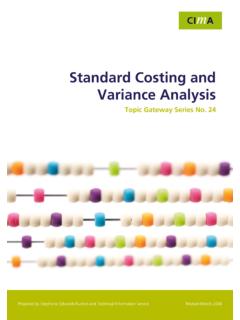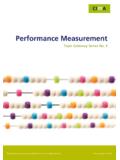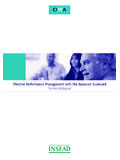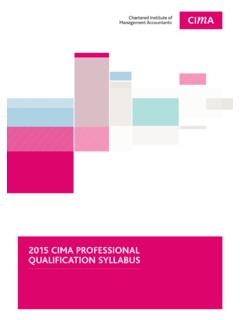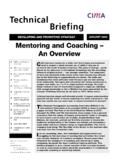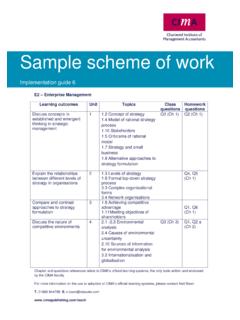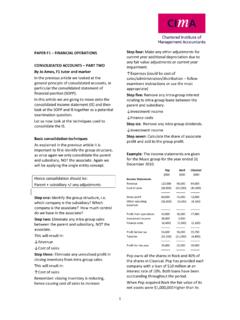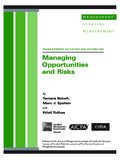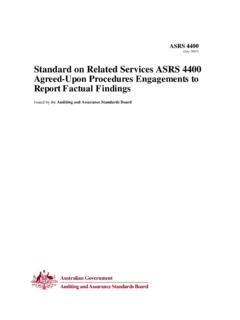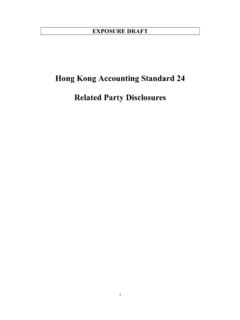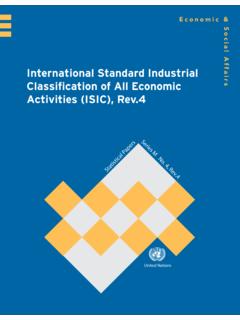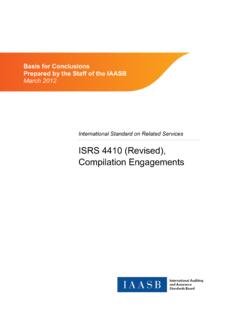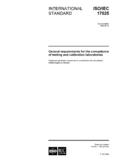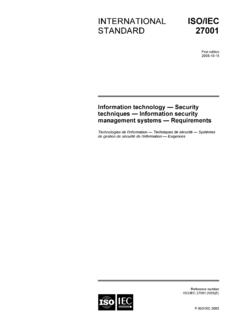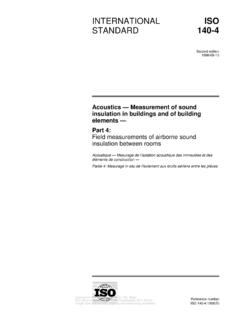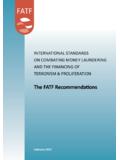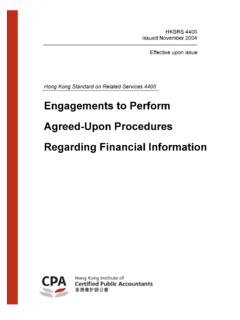Transcription of Challenges and successes in implementing …
1 CHALLENGESANDSUCCESSESINIMPLEMENTINGINTE RNATIONALSTANDARDS:ACHIEVINGCONVERGENCE TOIFRSSANDISASSEPTEMBER2004As the forces of globalizationprompt more and more coun-tries to open their doors to foreign investment and as businesses themselves expandacross borders, both the publicand private sectors are increas-ingly recognizing the benefits of having a commonly under-stood financial reporting framework supported by strongglobally accepted auditing benefits of a global financial reporting frame-work are numerous and include: Greater comparability of financial informationfor investors; Greater willingness on the part of investors toinvest across borders; Lower cost of capital; More efficient allocation of resources; and Higher economic growth.
2 Before these benefits can be fully realized, however,there must be greater convergence to one set of globally accepted high quality standards . Internationalconvergence is a goal that is embraced in IFAC s mission, shared by IFAC member bodies, the inter-national standard setters, and many national standardsetters, and supported by international international convergence, however, requiresmore than theoretical support. It requires reachingconsensus as to the international standards that will serve as the foundation for financial reporting andauditing globally, determining how to facilitate theadoption of those standards , and, ultimately, takingthe actions necessary to encourage report is a significant step in that November 2003, the IFAC Board agreed thatthere was a need to identify more clearly the challengesto adopting the international standards and to commu-nicate successful examples of how the internationalstandards have been and are being implemented.
3 As a former IFAC Board member, past president of the Hong Kong Institute of Certified Public Account-ants, and a Chartered Accountant who has workedwith both national and international standards formany years, I was asked to lead this project, defined in more detail on page 4,entailed the collection of views from a cross-section of the international financial reporting community:representatives from regional and national professionalaccountancy organizations; IFAC committees and permanent task forces; national standard setters; usersof financial statements; regulators; and professionalaccountants from a variety of backgrounds. This report details my findings and proposedactions for addressing the identified objective of this report is to stimulate furtherdiscussions and actions on the adoption and imple-mentation of the international standards so that we A financial reporting system supported by strong governance, high quality standards , andsound regulatory frameworks is key to economic development.
4 Indeed, high quality stand-ards of financial reporting, auditing, and ethics underpin the trust that investors place infinancial and nonfinancial information and, thus, play an integral role in contributing to a country s economic growth and financial PETER WONGP eter Wong, a former member of the Board of the international Federationof Accountants (IFAC), was commissioned by IFACto study the Challenges and successes in adoptingand implementing inter-national move closer to the goal of international conver-gence. Based on the successes of adoption and imple-mentation in some countries, I believe it is a goal thatis achievable over time. Given the significant publicinterest benefits, it is also a goal that I believe we cannot afford to put the public interest is one of the greatest Challenges facing our profession.
5 To do so effectively, we must all demonstrate that we follow high professional public will not and shouldnot accept any-thing less. If there are any impedi-ments to our abilityto follow profes-sional standards ,IFAC, together with international and national stand-ard setters, regulators, governments, and others identi-fied in this report, must work together to addressthem head-on. I am grateful for the help of the regional andnational professional accountancy organizations thatassisted in the arrangement of discussion groups, for those who took the time to participate in the discussions or to complete written submissions, andfor the dedication of the IFAC staff in supporting me in this , I must state that the views in this report are my personal views and do not necessarily reflectthe views of any of the organizations with which I am affiliated.
6 THEobjective of this report isto stimulate further discussionsand actions on the adoptionand implementation of inter-national standards so that wemay move closer to the goal of international convergence. PETER WONGP eter Wong was a member of the Board of the international Federationof Accountants from 2000 to 2003 and is currently a member of theBoard of the Global Reporting Initiative, which sets the Guidelines forSustainability (Environment, Social & Economic) Reporting. He retiredas Senior Tax Partner of Deloitte Touche Tohmatsu Hong Kong inMay 2002 and is currently a consultant to the firm. A past president ofthe Hong Kong Institute of Certified Public Accountants, he is now thechairman of the Business & Professionals Federation of Hong OF CONTENTSB ackground.
7 4 Summary of Principal Findings and Basic Assumptions .. 6 Understanding the Meaning of international Convergence .. 7 Translation of the international standards .. 11 Complexity and Structure of the international standards .. 13 Frequency, Volume, and Complexity of Changes to the international standards .. 14 Challenges for Small- and Medium-sized Entities and Accounting Firms .. 16 Potential Knowledge Shortfall .. 18 Implications of Endorsement of IFRSs .. 20 Proposals for Actions by Stakeholders .. 23 Summary and Conclusions .. 25 Appendix 1: List of Focus Group Meetings, Interviews, and Respondents .. 26 Appendix 2: List of Questions Covered in Focus Group Meetings,Interviews, and Written Submissions.
8 27 BACKGROUND4 Challenges ANDSUCCESSES INIMPLEMENTINGINTERNATIONALSTANDARDS:As the world continues to global-ize, discussion of convergenceof national and internationalstandards has increased signifi-cantly. Most major capital markets arenow actively discussing or pursuing effortsof convergence towards single sets of globally acceptedaccounting and auditing standards . IFAC, in an effort to facilitate international convergence, commissioned thisstudy to explore the Challenges and successes involved inadopting and implementing international standards . It is joined by international regulators, including theBasel Committee on Banking Supervision, the EuropeanCommission, the Financial Stability Forum, the Inter-national Association of Insurance Supervisors, the international Organization of Securities Commissions,and the World Bank, in recognizing that global capitalmarkets require high quality, globally consistent, and uniform regulatory and standards Benefits of Globally AcceptedInternational standards Globally consistent and uniform financial systems pro-vide cost-efficiencies to business and greater safeguardsto the public.
9 The public is entitled to have confidencethat, regardless of where a business activity occurs, thesame high quality standards were applied. It is widelyrecognized that investors will be more willing to diversifytheir investments across borders if they are able to relyon financial information based on a similar set of stand-ards. Thus, adherence to international standards , such asthose developed by the international Accounting Stand-ards Board (IASB) and the international Auditing andAssurance standards Board (IAASB), can ultimately leadto greater economic expansion. Support for international ConvergenceThe Financial Stability Forum (FSF)1included the Inter-national Financial Reporting standards (IFRSs) issued bythe IASB and the international standards on Auditing(ISAs) issued by the IAASB in its 12 Key standards forSound Financial Systems.
10 The FSF indicated that these 12 Key standards are most likely to make the greatestcontribution to reducing vulnerabilities and strengthen-ing the resilience of financial report on Rebuilding Public Confidence in Financial Reporting An international Perspective, issuedin July 2003, provided further support for IFRSs andISAs becoming the worldwide standards . The report wasdeveloped by the Task Force on Rebuilding Public Con-fidence in Financial Reporting an independent groupcommissioned by IFAC to address, from an internationalperspective, the loss of credibility in financial reportingand approaches to resolving the problem. The task forcerecommended that convergence of national and inter-national standards be achieved as soon as possible, view-ing this as a significant public interest has committed itself to the achievement ofglobal convergence of national standards with IFRSs andISAs.
